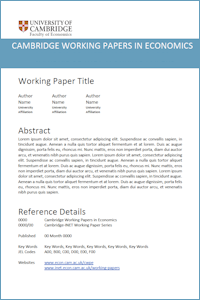
Guinnane, T. W., Hoffman, P.
Persistence and Historical Evidence: The Example of the Rise of the Nazi Party
CWPE2271
Abstract: The persistence literature in economics and related disciplines connects recent outcomes to events long ago. Although this influential literature is promising, it raises serious questions about how to distinguish deep causal factors that persist across time from alternative explanations derived from the rapidly changing historical context or misuse of historical sources. We discuss two prominent examples that ground the rise of the Nazi Party in distant historical roots. Several econometric, analytical, and historical errors undermine the papers’ contention that deeply rooted culture and social capital fuelled the Nazi rise. The general lesson for persistence studies is that beyond careful econometrics and serious consideration of underlying mechanisms (including formal theory), they must pay scrupulous attention to the historical context and the limitations of historical data.
Keywords: Historical persistence, medieval pogroms, social capital, culture, networks, Nazism, voting behavior, anti-Semitism, political parties, religion, empirical economics, data based estimates, econometrics
JEL Codes: C18 D71 D72 D85 D91 L14 N01 N13 N14 Z10 Z12
PDF: https://www.econ.cam.ac.uk/research-files/repec/cam/pdf/cwpe2271.pdf 
Open Access Link: https://doi.org/10.17863/CAM.93385.3
